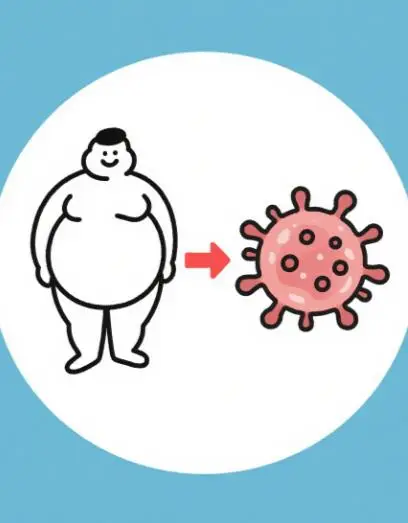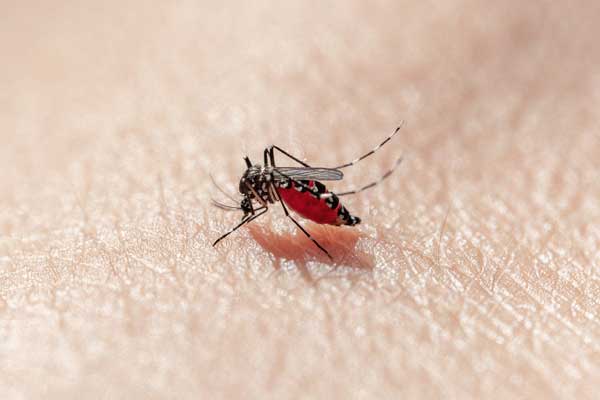When weight exceeds the healthy range, the impact it brings is far more than just changes in body shape. It may become a "booster" for chronic diseases such as diabetes and cardiovascular disease, and is also secretly related to the risk of multiple cancers, posing a great threat to one's own health.
Does obesity really cause cancer?
How should obese cancer patients control their weight?

Carcinogenic factors of obesity
The International Agency for Research on Cancer pointed out that obesity is the second largest preventable cancer risk factor after tobacco. Obesity is closely related to the risk of 12 types of cancer. About 4-8% of cancers can be directly attributed to obesity.
Dysfunction of internal organs: Obese people are prone to cancer, mainly because obesity causes systemic metabolic disorders, the body falls into a state of chronic inflammatory response, and immunity decreases. These factors work together to make obese people a high-risk group for cancer.
Obesity and cancer treatment
Weight management is a key factor affecting the treatment effect, quality of life and prognosis for cancer patients, and it runs through the entire treatment process.
- Increased chemotherapy dose: When using chemotherapy drugs for anti-tumor treatment, it is necessary to calculate the body surface area based on height and weight to calculate the dosage of chemotherapy drugs. Under the same height, obese patients have a larger body surface area and use higher doses of chemotherapy drugs. As a result, obese cancer patients also have more severe adverse reactions to chemotherapy (such as gastrointestinal reactions, liver and kidney damage).
- Limitations of basic diseases: Obese patients are often accompanied by basic diseases such as high blood sugar, high blood lipids, and high blood pressure, which limits doctors' choice of chemotherapy drugs.
Complex physical conditions make it difficult to proceed with anti-tumor treatment as planned, resulting in poor treatment effects, poor quality of life for patients, increased risk of recurrence, shortened survival, and reduced overall survival rate.
However, obesity is not completely useless in some aspects. Studies have found that obese patients have higher immune responses than non-obese patients, and their 5-year survival rate is higher than that of non-obese patients when receiving immunotherapy.
Given the complex relationship between obesity and cancer, how should cancer patients manage their weight scientifically?

Weight loss is important to "prevent before illness"
For overweight cancer patients, especially those with precancerous lesions and obesity, such as lung nodules, breast nodules, and gastrointestinal polyps, it is necessary to actively lose weight.
By changing lifestyle habits and insisting on physical exercise, it can not only reduce body mass index, but also regulate hormone levels such as sex hormones, inhibit inflammation, enhance immune function, improve body metabolism, promote the body to enter a benign cycle, and effectively prevent precancerous lesions from transforming into cancer.
Weight loss is important to "prevent after illness"
Treatment period: Active weight loss is prohibited during the treatment period, and the focus should be on preventing unplanned weight loss. Patients whose tumors continue to progress and are not under control may experience a sharp weight loss due to tumor cachexia. Active weight loss at this time will worsen the patient's nutritional status, further reduce the body's immunity, make it difficult to maintain treatment, and the tumor will take advantage of the opportunity to enter, seriously affecting the treatment effect.
In addition, for patients undergoing immunotherapy, weight loss may affect the efficacy, and it is not recommended to lose weight at this time.
Within half a year after surgery and radiotherapy and chemotherapy: At this time, the patient's liver and kidney function and physical fitness have not yet recovered to the level of daily life, and the body has not fully recovered from the invasion of the tumor. At this time, weight loss is not conducive to physical recovery, and weight loss is not recommended.

Weight loss is important to "prevent recurrence after recovery"
- Physical state recovery: For obese patients who have completed comprehensive anti-tumor treatment for more than half a year, whose condition is stable and whose physical state has recovered, weight loss has a protective effect on the cardiovascular system, and can also enhance immune function, improve body metabolism, and have a positive impact on tumor prognosis.
- Stable nutritional status: Obese patients in the recovery period can start a personalized weight loss plan after their nutritional status is stable. Ensure high protein and low carbon water intake in diet to prevent muscle loss; choose aerobic exercise combined with progressive resistance training for exercise, and maintain 150 minutes of moderate intensity exercise time per week.
- Dynamic nutritional assessment: The weight loss plan needs to be formulated based on dynamic nutritional assessment to avoid aggravating cancer-related consumption due to weight loss.
Obesity is not only one of the high-incidence factors for cancer, but also an important factor affecting prognosis. Cancer patients need to manage their weight scientifically and follow the principle of staged management at different stages. Please lose weight scientifically and live a healthy life under the guidance of a doctor.

%20--%3e%3c!DOCTYPE%20svg%20PUBLIC%20'-//W3C//DTD%20SVG%201.1//EN'%20'http://www.w3.org/Graphics/SVG/1.1/DTD/svg11.dtd'%3e%3csvg%20version='1.1'%20id='图层_1'%20xmlns='http://www.w3.org/2000/svg'%20xmlns:xlink='http://www.w3.org/1999/xlink'%20x='0px'%20y='0px'%20width='256px'%20height='256px'%20viewBox='0%200%20256%20256'%20enable-background='new%200%200%20256%20256'%20xml:space='preserve'%3e%3cpath%20fill='%23FFFFFF'%20d='M194.597,24.009h35.292l-77.094,88.082l90.697,119.881h-71.021l-55.607-72.668L53.229,232.01H17.92%20l82.469-94.227L13.349,24.009h72.813l50.286,66.45l58.148-66.469V24.009z%20M182.217,210.889h19.566L75.538,44.014H54.583%20L182.217,210.889z'/%3e%3c/svg%3e)




